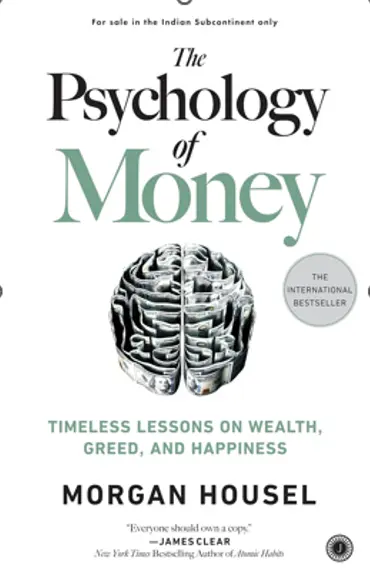Morgan Housel’s ‘Psychology of Money’ transcends traditional financial literature, delving into the psychological underpinnings of wealth. The book redefines success, emphasizing a holistic approach to financial well-being beyond numerical values. Housel’s insights guide readers through the maze of behavioral finance, providing a roadmap to informed financial decision-making.
Investing wisdom takes center stage as Housel explores the psychological intricacies of investment strategies. He challenges conventional money mindsets, fostering a transformative shift in readers’ approach to wealth. ‘Psychology of Money’ is not just a book; it’s a timeless guide to building a robust wealth psychology for enduring prosperity.
Overall, Housel’s masterpiece offers readers a compass for financial enlightenment. The book’s exploration of Financial Psychology, Investment Strategies, and Money Mindset serves as an invaluable resource for those seeking a deeper understanding of the profound connection between human behavior and financial decisions.
Deciphering Financial Wisdom: 5 Key Insights from ‘Psychology of Money’ by Morgan Housel
Introduction:
In the intricate tapestry of personal finance, Morgan Housel’s “Psychology of Money” serves as a compelling guide, unraveling the complexities of wealth, behavior, and the profound psychology that shapes our financial journey. This article embarks on a journey to extract five crucial takeaways that form the core of Housel’s enlightening exploration.
1. Holistic Wealth Understanding:
Housel challenges the conventional notion of wealth, urging readers to embrace a holistic understanding. True financial well-being, as outlined in the book, transcends mere numerical values, emphasizing a comprehensive philosophy that extends beyond traditional definitions.
2. Behavioral Finance Mastery:
Unpacking the mysteries of behavioral finance, Housel offers readers a roadmap to navigate financial decision-making. The book underscores the influence of psychological factors on money choices, promoting a mindful money mindset that forms the bedrock of informed financial decisions.
3. Investment Wisdom Beyond Numbers:
Housel’s exploration of investment strategies goes beyond numerical metrics. The book delves into the psychological aspects of investing, providing readers with a nuanced understanding of how mindfulness shapes investment decisions for sustainable, long-term success.
4. Cultivating Robust Wealth Psychology:
“Psychology of Money” is a call to cultivate a resilient wealth psychology. Housel advocates for a transformative shift in money mindsets, guiding readers through the emotional landscape of finance and instilling enduring principles for financial success.
5. Mindful Spending and Financial Literacy:
Housel champions mindful spending as a gateway to financial well-being. The book imparts valuable personal finance insights, fostering financial literacy and empowering readers to make conscious choices aligned with their values.
Conclusion:
Housel’s masterpiece offers readers a compass for financial enlightenment. The book’s exploration of Financial Psychology, Investment Strategies, and Money Mindset serves as an invaluable resource for those seeking a deeper understanding of the profound connection between human behavior and financial decisions.
7 Real-Life Benefits from the Jist of the “Psychology of Money” by Morgan Housel:
“The Psychology of Money” by Morgan Housel is a book that delves into the behavioral aspects of finance and money management. Here are seven real-life benefits that readers may derive from the essence of the book:
1. Long-Term Perspective:
The book encourages a long-term perspective on financial decisions. By understanding the impact of time and compounding, readers may develop patience and resist the urge to make impulsive, short-term decisions that can undermine financial goals.
2. Emotional Resilience:
Housel explores the emotional and psychological aspects of money management. Readers may gain insights into their own behaviors, learning to navigate emotions such as fear and greed. This can lead to more rational and resilient financial decision-making.
3. Understanding Risk:
“The Psychology of Money” provides insights into risk and uncertainty in financial markets. Readers may develop a better understanding of risk tolerance, helping them make informed decisions about investments and financial strategies.
4. Simplicity in Investing:
Housel emphasizes the importance of simplicity in investment strategies. Readers may benefit from adopting straightforward approaches to managing their finances, avoiding unnecessary complexity that can lead to confusion and poor decision-making.
5. Adaptability:
The book explores the idea of adapting to changing financial landscapes. Readers may learn to be flexible in their approach to money management, adjusting strategies as needed in response to life changes, economic shifts, or unexpected events.
6. The Role of Behavior in Finance:
Housel delves into the role of human behavior in financial outcomes. Readers may gain insights into their own behavioral patterns and biases, helping them make more conscious financial decisions and avoid common pitfalls.
7. Defining True Wealth:
The book prompts readers to consider what true wealth means to them beyond monetary measures. By redefining wealth in a broader sense that includes happiness, fulfillment, and life satisfaction, individuals may make financial decisions that align with their values and overall well-being.
Frequently asked questions:
1: What is the “Psychology of Money” about?
“Psychology of Money” explores the psychological and behavioral aspects that influence financial decisions, providing insights into the complex relationship between human behavior and wealth accumulation.
2: Who is the author of “Psychology of Money”?
The book is authored by Morgan Housel, a financial writer and partner at The Collaborative Fund, known for his insightful perspectives on personal finance and investing.
3: How does the book redefine wealth?
Morgan Housel challenges traditional notions of wealth by emphasizing a holistic understanding beyond numerical values. True wealth, as per the book, involves a comprehensive approach to financial well-being.
4: What is the significance of behavioral finance in the book?
“Psychology of Money” delves into behavioral finance, revealing how psychological factors impact financial decision-making. It provides readers with a roadmap for navigating the emotional and cognitive aspects of managing money.
5: What are some key takeaways regarding investment strategies?
The book goes beyond numerical metrics in exploring investment strategies. It offers insights into the psychological aspects of investing, guiding readers towards mindful and sustainable investment decisions.
6: How does the book address the emotional aspects of money?
Morgan Housel advocates for cultivating a robust wealth psychology, guiding readers through the emotional landscape of finance. The book instills enduring principles for financial success by addressing the emotional aspects of money and investing.
7: What role does mindful spending play in the “Psychology of Money”?
Mindful spending is highlighted as a gateway to financial well-being. The book encourages readers to make conscious choices aligned with their values, fostering financial literacy and empowerment.
8: Can the book be applied to different financial situations?
Yes, the principles outlined in “Psychology of Money” are applicable to various financial situations. The book provides universal insights that can guide individuals regardless of their specific financial circumstances.
9: How does the author promote enduring financial success?
The book promotes enduring financial success by advocating for a transformative shift in money mindsets. It encourages readers to understand the emotional and psychological factors influencing financial decisions, fostering principles that stand the test of time.
10: Is “Psychology of Money” suitable for individuals with varying levels of financial literacy?
Yes, the book is designed to be accessible to readers with varying levels of financial literacy. It provides valuable insights and principles that can benefit both beginners and those well-versed in personal finance.
Who Is Morgan Housel?
 Morgan Housel has carved a niche for himself in the realm of financial writing, recognized for his insightful commentary on investing, behavioral finance, and personal finance.
Morgan Housel has carved a niche for himself in the realm of financial writing, recognized for his insightful commentary on investing, behavioral finance, and personal finance.
Throughout his career, Morgan Housel has contributed significantly to financial publications, serving as a columnist for esteemed outlets such as The Motley Fool and The Wall Street Journal. His writings delve into topics such as investment strategy, market behavior, and the intricate interplay between psychology and financial decision-making. Renowned for his ability to articulate complex financial concepts with clarity and relatability, Housel’s work resonates with a broad audience.
As an author, Housel has penned books that distill his knowledge and perspectives on finance for a wider readership. “The Psychology of Money” stands out as one of his notable works, where he explores the behavioral aspects of financial decision-making and imparts lessons gleaned from studying the financial histories of individuals.
Morgan Housel’s investment philosophy is characterized by a keen understanding of human behavior in financial markets. He emphasizes the impact of emotions, biases, and cognitive errors on investment decisions, advocating for a thoughtful and long-term approach to investing.
In addition to his contributions to traditional financial publications, Housel maintains an online presence. Whether through his website, social media channels, or other online platforms, he engages with a diverse audience interested in finance and investing, further expanding the reach of his insights.
Frequently asked questions about Morgan Housel:
who is Morgan Housel?
Morgan Housel is a renowned financial writer and author known for his contributions to investing and behavioral finance. He has authored “The Psychology of Money” and is recognized for his ability to communicate complex financial concepts with clarity.
How old is Morgan Housel?
As of 2023, Morgan Housel is 33 years old.

No Comments on “The Psychology of Money” by Morgan Housel: Key Insights